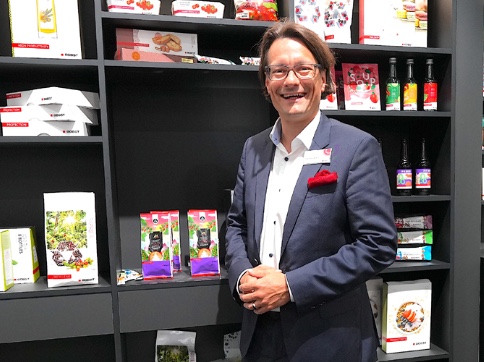Newspaper & Mailroom
Golden Pen of Freedom awarded to Nicaraguan journalist Carlos Chamorro

Thursday 30. May 2024 - The 2024 Golden Pen of Freedom, the annual press freedom award of the World Association of News Publishers (WAN-IFRA), has been awarded to Nicaraguan journalist Carlos Fernando Chamorro, editor-in-chief of Confidencial, currently in exile in Costa Rica.
The award, made during the 2024 World News Media Congress taking place in Copenhagen, Denmark “is a symbol of struggle and the necessary courage to fight on in the name of press freedom.”
“At a time when freedom of the press and freedom of expression are under attack in Nicaragua, while there is a process of criminalization of independent journalism in other countries of Latin America, I am deeply honoured to receive the Golden Pen of Freedom,” said Carlos Chamorro in accepting the award.
“It is an honor that I receive together with my colleagues at Confidencial, who make it possible for us to continue doing quality journalism in exile; and I share it with all the independent journalists of Nicaragua, whose resistance also in exile, represents the last reserve of freedom under a totalitarian dictatorship.”
Carlos Chamorro’s journey has taken him from political activism with the leftist Sandinista movement in the 1980s, to recognising the need for independent journalism once Nicaragua transitioned to democracy in the 1990s. More recently, it has placed him in the crosshairs of an increasingly authoritarian government.
Despite now living and working from exile in Costa Rica, he continues to run online investigative outlet Confidencial – a leading source of quality independent reporting on Nicaragua and the region.
The award honours “a journalist steeped in the fight for freedom, beset by tragedy, and who mirrors the rise and fall of the nation he has served for decades – one whose ongoing struggle and sacrifice reflects the hopes and ideals of millions for a better future,” said Martha Ramos, editorial director of Organización Editorial Mexicana (OEM) in Mexico, and president of the World Editors Forum, WAN-IFRA’s community for leading global editors, in announcing the award.
“In polarised times, between political extremes, the victim has always been – and will remain – the press. Our laureate knows this all too well. His journey from politics to the top of the media has come full circle and is a deeply personal one, mirroring the highs and lows of the continent he calls home,” Ramos continued.
After nearly two decades of optimism and progress following the end of a civil war that had torn the country apart during the 1980s, Sandinista leader Daniel Ortega returned as president of Nicaragua in 2007. His regime quickly began dismantling the institutions created to place checks and balances on the government, including the country’s independent media.
Having launched some of the most successful news outlets in Nicaragua – the TV magazine Esta Semana in 1995, the investigative publication Confidencial a year later, and the daily TV news show Esta Noche in 2005 – Carlos Chamorro was a clear target.
However, the Chamorro family were already singled out as both political and ideological opponents. Marking the country’s return to democratic politics, Carlos’s mother, Violeta Barrios, had defeated incumbent Daniel Ortega (in his first stint as head of state) to become president of Nicaragua in 1990.
His father, Pedro Joaquín Chamorro Cardenal, the publisher and editor of La Prensa – the only independent title during the right-wing Samoza dictatorship – was assassinated in 1978, a tragedy that motivated the young Carlos, already a member of the FSLN movement, to move into journalism as editor of the Sandinista newspaper, Barricada.
A 15-year career stint at Barricada saw him steward the title through civil war, peace negotiations, and national reconstruction, but it was Chamorro’s insistence on applying journalistic professionalism – turning criticism on the Party through the pages of its own publication – that eventually put him in direct conflict with FSLN leader, Daniel Ortega. In 1994, he was sacked from his position; a decision that would unleash an indefatigable force into Latin American journalism.
Despite growing harassment under Ortega’s second administration, for the first few years the Nicaraguan press was initially able to report and investigate corruption. As the president’s hold on power tightened, however, Carlos Chamorro was stripped of some of his news outlets. When protests against the government erupted in 2018, partly due to revelations of corruption and abuse of power uncovered by Chamorro’s staff, Ortega reacted with fury and Confidencial became a target. The police raided its offices and newsroom in December of that year, along with the offices of non-governmental organisations dedicated to human rights.
Despite briefly leaving the country in early 2019, Carlos Chamorro returned only to see his brother, Pedro Joaquín (a leader in the opposition, and the 1982 Golden Pen of Freedom laureate – awarded for his stewardship of La Prensa following the assassination of their father), and his sister, Cristiana (who was running as a presidential candidate in the planned election of November 2021), both arrested.
That prompted Chamorro to leave Nicaragua for good, just as he was accused of money laundering and the regime was preparing to throw him in jail. He settled in Costa Rica, from where he runs Confidencial today, working with a staff that is scattered across several countries.
“I dedicate this award to all Latin American journalists facing political persecution and imprisonment, such as Victor Ticay in Nicaragua; José Rubén Zamora in Guatemala; Mayelín Rodríguez in Cuba; and others who are seriously threatened such as Gustavo Gorriti in Peru; and the team of Armando.Info in Venezuela.
The Golden Pen of Freedom belongs to all of them, and this recognition encourages us not to give in to censorship and self-censorship, and to do more and better journalism, which is the only defence we have to protect freedom and democracy.”


